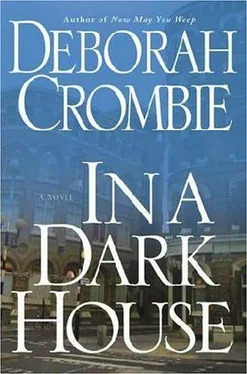He didn’t like where this was leading at all. “So what you’re telling me is that you think we have a pro, and that he’s escalating? A serial arsonist?”
The satisfaction faded from Rose’s face. “I could be wrong. But…”
“But if, by some chance, you were right, it would be impossible to prove.”
“Well, yeah. Unless there were witnesses that haven’t come forward. Or some forensic evidence left at the scenes that no one knew to look for.” Looking less happy by the minute, Rose traced a pattern on the tablecloth with her teaspoon, then set the spoon down and began gathering up her papers. “I’m sorry. This isn’t much use to you, is it?”
There were arguments against her theory, but he certainly didn’t think they could afford to dismiss it. “Maybe not,” he said, “but that doesn’t mean you shouldn’t discuss this with Bill Farrell. He’s been concentrating on the crime scene, so he may not have had a chance to research these fires as thoroughly as you have.”
She stopped, papers halfway folded, and looked up at him.
“If I give him your number and he rings you, then you won’t be in trouble with your boss, right?” Kincaid continued. “After all, you can’t refuse to talk to the FIT.” Farrell, he thought, might want to encourage her, regardless of whether her theory was pertinent to last night’s fire. Rose Kearny had the makings of an investigator. Although her station officer might consider her insubordinate, Kincaid had found a streak of independence essential in a good detective.
“No, I suppose not.” The corners of her mouth curved up, and he found he liked making her smile.
“Are those photocopies?” He gestured towards the papers, and when she nodded, said, “Why don’t you give them to me, and I’ll pass them along to Farrell along with your number. But, Rose…” He debated how much he could tell her. “There are reasons why this fire may not fit your pattern. I can’t give you any details from the postmortem, but it looks as though this fire may have been set to cover up a homicide.”
Her face tightened. “I hadn’t forgotten the body. But it’s not unheard of for serial arsonists to escalate to murder.”
“No, but think about it. You saw the victim. She’d been stripped. The most logical explanation is that the killer wanted to conceal her identity. Why would a serial arsonist care to hide his victim’s identity?”
“For the same reason anyone would. To prevent a connection being made between killer and victim. Do you have any idea who she was?”
Kincaid pulled the CCTV photo from the folder he’d carried with him and handed it across the table. “This woman entered the building a couple of hours before the fire. We’ve no way of knowing when – or if – she left. Do you recognize her, by any chance?”
Rose studied the photo for a long moment before reluctantly shaking her head. “No. She looks young, doesn’t she? I hate to think…” She started to hand the photo back, then stopped and looked at it again. “There is something about her, though, that looks familiar. I just can’t quite put my finger on it. Maybe she looks like someone on the telly?”
As the waitress came with their check, Rose gave an apologetic shrug and let him slip the photo back into his folder. Glancing at his watch, Kincaid realized he was running short of time if he meant to go back to the shelter before meeting Gemma.
Rose scribbled a number on the photocopied sheets, then stood and handed him the papers. “I won’t take up any more of your time. I’ve put down my mobile number if Station Officer Farrell wants to talk to me. Thanks for the tea.” She met his eyes. “And thanks for not telling me I’m crazy.”
“I don’t think you’re crazy. But I hope you’re wrong.”
“Yeah. Me, too,” Rose said slowly. “Because the thing is… if I’m right… there are going to be more fires.”
This time, when Kincaid buzzed at the shelter’s entrance, Kath Warren answered immediately. When he identified himself and asked if he could come up, however, she hesitated, then said she’d come down. A moment later the door clicked open and she slipped into the vestibule.
“I’m sorry,” she said a bit breathlessly. “It’s just that having the police in yesterday upset a number of the residents. You have to understand that these women live on the edge of paranoia at the best of times, and anyone coming into their space is perceived as a threat. It’s my fault – I should have realized.”
The crisp efficiency she’d displayed the previous day seemed a little frayed round the edges, and her careful makeup didn’t quite conceal the shadows beneath her eyes.
“I’m the one that should apologize,” he told her. “We shouldn’t have tramped in like an invading army.”
Kath smiled and seemed to thaw a bit. “We’ve conspiracy theories going round like a virus, I can tell you. First, it was that someone’s husband had set the fire so that the women would have to evacuate the building. Now, it’s some sort of police infiltration plot, but I haven’t quite figured that one out.”
“Do the women’s husbands know where they are?” Kincaid asked, curious.
“No- at least we hope not. We don’t advertise what we do here, but the women do go out during the day; they’re not prisoners. There’s always the chance of a slipup, either from someone being seen and followed, or – and I’m sorry to say it’s more likely – from one of the residents giving out the location in a weak moment. It’s not a perfect system, but we do the best we can.”
“You don’t place any credence in the evacuation idea?”
Kath shrugged. “I suppose it’s possible. But in that case, why not start the fire in this building? The front half is vacant, and I imagine it would be easy enough for someone to break in.”
“Would one of these men be desperate enough to endanger his own children?”
Kincaid’s skepticism must have shown in his voice, because Kath said sharply, “These men are abusers. Many of them beat their children as well as their wives or partners. And they’re very good at justifying what they do, both to themselves and to other people.”
She was right, Kincaid knew, and right about the security risk from the derelict front half of the building. Uneasily, he thought of Rose Kearny’s hypothetical arsonist. This building would make a perfect target, and he wondered how easily the shelter’s families could be evacuated in case of a fire. He’d have a word with Bill Farrell about it when he passed along Rose’s papers.
“It’s not just the fire, of course,” continued Kath, “but the woman’s death. It’s upset everyone. I don’t suppose you’ve any idea yet who she was?”
“Nothing definite, as yet.” Kincaid pulled out a copy of the photo. “But a CCTV camera caught this woman entering the building a couple of hours before the fire. That’s why I came by. Do you recognize her?”
Kath took the paper from him and studied it carefully before shaking her head. “No. No, sorry. I don’t think I’ve ever seen her.”
“Not one of your former residents?”
“No. Not since I’ve been here, and that’s been five years.”
“Would you mind showing the photo to the residents, and to your assistant? Maybe it will ring a bell with someone.”
“Jason’s out today, but I’ll be glad to hand it round the wom-”
Kath was facing the outside door. Kincaid saw her eyes widen in surprise. He spun round just as a tall man pushed roughly past him and grabbed Kath by the shoulders.
“Hey!” Kincaid called out. “What do you think you’re doing? Let her-” He fell silent as Kath held up a cautionary hand.
“Where’s my wife?” the man shouted at Kath, giving her a shake.
Читать дальше












